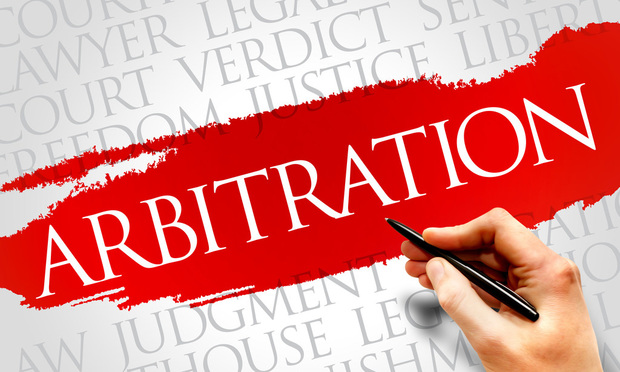UM Arbitration Award Stands Despite Questions Over Arbitrator's Neutrality
Despite the existence of a financial relationship between an arbitrator and an insurance company lawyer involved in an arbitration, it did not affect the outcome of the case, an appeals court has ruled.
February 06, 2019 at 04:57 PM
3 minute read
 Photo credit: Shutterstock.com
Photo credit: Shutterstock.com
Despite the existence of a financial relationship between an arbitrator and an insurance company lawyer involved in an arbitration, it did not affect the outcome of the case, an appeals court has ruled.
A three-judge Superior Court panel upheld a Luzerne County judge's denial of summary judgment requested by Patricia and Stanley Neishel against Erie Insurance Exchange. The Neishels sought to vacate a $35,000 arbitration award granted by arbitrator Enid Harris, who had previously worked as an independent contractor for Erie's attorney in the case.
The Luzerne County judge reasoned that no undue influence tainted the case because Harris did not work on files pertaining to the case at hand while in the employ of Erie's representation, nor was she ever directly compensated by Erie.
On appeal, the Neishels questioned whether due process was observed in allowing the award to stand.
According to Judge Kate Ford Elliott's unpublished opinion, the Neishels argued that “'the suggested relationship between [the arbitrator selected by Erie] and [Erie's counsel] Robert T. Panowicz, Esquire, if accurate, prohibited a fair and impartial hearing.'”
“Appellants, however, neither alleged nor demonstrated that their rights were prejudiced by any evident corruption or misconduct on the part of attorney Harris,” Ford Elliott said. “Rather, appellants merely alleged and demonstrated that attorney Harris worked on some of attorney Panowicz's cases as a legal subcontractor and that it was possible that appellants' case was assigned to attorney Panowicz when attorney Harris rendered services to attorney Panowicz three years prior to the arbitration. This allegation, however, is not a statutorily valid ground to vacate the arbitration award. ”
Ford Elliott was joined by Judges Susan Peikes Gantman and Carolyn Nichols.
The ruling echoed Luzerne County Judge Thomas Burke Jr.'s holding, contained in the Superior Court's opinion:
“ While in hindsight it is clear that [Erie's] choice of attorney Harris as its arbitrator without, minimally, disclosing the nature of her prior professional relationship with [appellants'] counsel was less than ideal, the court was not persuaded that the law required that the award be vacated under the circumstances of this case, especially where, as here, the award was unanimous and there was no evidence whatsoever to indicate that attorney Harris exerted any influence over the other two arbitrators, one of whom is a well-seasoned plaintiff's attorney and the other a retired judge.”
Jeffrey Stanton of Haggerty, Goldberg, Schleifer & Kupersmith in Philadelphia represents the Neishels and said that the situation was “disheartening.”
“Despite the court's ruling to the contrary, we believe this case highlights the importance of the disclosure of potential conflicts of interest in extra judicial proceedings,” Stanton said.
Panowicz, Erie's attorney, said, “We had raised a number of defenses in our position and the court chose to take the narrowest approach, which is consistent with the basic judicial canons.”
(Copies of the 8-page opinion in Erie Insurance Exchange v. Neishel, PICS No. 19-0166, are available at http://at.law.com/PICS.)
This content has been archived. It is available through our partners, LexisNexis® and Bloomberg Law.
To view this content, please continue to their sites.
Not a Lexis Subscriber?
Subscribe Now
Not a Bloomberg Law Subscriber?
Subscribe Now
NOT FOR REPRINT
© 2025 ALM Global, LLC, All Rights Reserved. Request academic re-use from www.copyright.com. All other uses, submit a request to [email protected]. For more information visit Asset & Logo Licensing.
You Might Like
View All
Lawsuit Against Major Food Brands Could Be Sign of Emerging Litigation Over Processed Foods
3 minute read

People in the News—Jan. 23, 2025—Marshall Dennehey, Duane Morris, Hangley Aronchick
3 minute read
Plaintiff Argues Jury's $22M Punitive Damages Finding Undermines J&J's Talc Trial Win
4 minute readTrending Stories
Who Got The Work
J. Brugh Lower of Gibbons has entered an appearance for industrial equipment supplier Devco Corporation in a pending trademark infringement lawsuit. The suit, accusing the defendant of selling knock-off Graco products, was filed Dec. 18 in New Jersey District Court by Rivkin Radler on behalf of Graco Inc. and Graco Minnesota. The case, assigned to U.S. District Judge Zahid N. Quraishi, is 3:24-cv-11294, Graco Inc. et al v. Devco Corporation.
Who Got The Work
Rebecca Maller-Stein and Kent A. Yalowitz of Arnold & Porter Kaye Scholer have entered their appearances for Hanaco Venture Capital and its executives, Lior Prosor and David Frankel, in a pending securities lawsuit. The action, filed on Dec. 24 in New York Southern District Court by Zell, Aron & Co. on behalf of Goldeneye Advisors, accuses the defendants of negligently and fraudulently managing the plaintiff's $1 million investment. The case, assigned to U.S. District Judge Vernon S. Broderick, is 1:24-cv-09918, Goldeneye Advisors, LLC v. Hanaco Venture Capital, Ltd. et al.
Who Got The Work
Attorneys from A&O Shearman has stepped in as defense counsel for Toronto-Dominion Bank and other defendants in a pending securities class action. The suit, filed Dec. 11 in New York Southern District Court by Bleichmar Fonti & Auld, accuses the defendants of concealing the bank's 'pervasive' deficiencies in regards to its compliance with the Bank Secrecy Act and the quality of its anti-money laundering controls. The case, assigned to U.S. District Judge Arun Subramanian, is 1:24-cv-09445, Gonzalez v. The Toronto-Dominion Bank et al.
Who Got The Work
Crown Castle International, a Pennsylvania company providing shared communications infrastructure, has turned to Luke D. Wolf of Gordon Rees Scully Mansukhani to fend off a pending breach-of-contract lawsuit. The court action, filed Nov. 25 in Michigan Eastern District Court by Hooper Hathaway PC on behalf of The Town Residences LLC, accuses Crown Castle of failing to transfer approximately $30,000 in utility payments from T-Mobile in breach of a roof-top lease and assignment agreement. The case, assigned to U.S. District Judge Susan K. Declercq, is 2:24-cv-13131, The Town Residences LLC v. T-Mobile US, Inc. et al.
Who Got The Work
Wilfred P. Coronato and Daniel M. Schwartz of McCarter & English have stepped in as defense counsel to Electrolux Home Products Inc. in a pending product liability lawsuit. The court action, filed Nov. 26 in New York Eastern District Court by Poulos Lopiccolo PC and Nagel Rice LLP on behalf of David Stern, alleges that the defendant's refrigerators’ drawers and shelving repeatedly break and fall apart within months after purchase. The case, assigned to U.S. District Judge Joan M. Azrack, is 2:24-cv-08204, Stern v. Electrolux Home Products, Inc.
Featured Firms
Law Offices of Gary Martin Hays & Associates, P.C.
(470) 294-1674
Law Offices of Mark E. Salomone
(857) 444-6468
Smith & Hassler
(713) 739-1250





